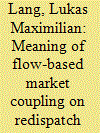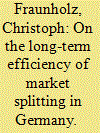| Srl | Item |
| 1 |
ID:
169843


|
|
|
|
|
| Summary/Abstract |
Energy market modelling lacks an approach that tackles the implications of flow-based market coupling on congestion management in European electricity markets. Especially in the context of high shares of renewable energy, the topic of network congestion is becoming even more important. Usually, redispatch measures as a main part of congestion management are calculated on the basis of a simple load flow model incorporating net transfer capacities on the day-ahead market. In this paper, we suggest a modelling approach that incorporates the attributes of flow-based market coupling in the calculation of congestion management. An advanced load flow model is therefore already used to reflect the allocation process on the spot market. Retaining this result, necessary congestion management can be calculated on the basis of a more detailed network model representing the control areas’ exact transmission lines. Also, we conduct a comparison between the net transfer capacity- and the flow-based market coupling approach representing different levels of grid-granularities to show the importance of the grid model used for allocation on the European market for electricity. The results suggest, that necessary congestion management in the system is heavily dependent on the grid granularity, both in the sign and magnitude.
|
|
|
|
|
|
|
|
|
|
|
|
|
|
|
|
| 2 |
ID:
177321


|
|
|
|
|
| Summary/Abstract |
In Europe, the ongoing renewable expansion and delays in the planned grid extension have intensified the discussion about an adequate electricity market design. Against this background, we jointly apply an agent-based electricity market model and an optimal power flow model to investigate the long-term impacts of splitting the German market area into two price zones. Our approach allows capturing long-term investment and short-term market behavior under imperfect information. We find strong impacts of a German market splitting on electricity prices, expansion planning of generators and required congestion management. While the congestion volumes decrease significantly under a market split in the short term, the optimal zonal configuration for 2020 becomes outdated over time due to dynamic effects like grid extension, renewable expansion and new power plant investments. Policymakers and regulators should therefore regularly re-assess bidding zone configurations. Yet, this stands in contrast to the major objective of price zones to create stable locational investment incentives.
|
|
|
|
|
|
|
|
|
|
|
|
|
|
|
|